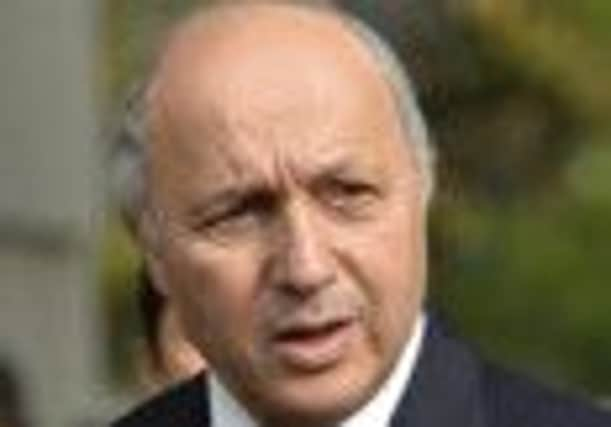Iran nuclear talks hit Geneva impasse


A western diplomat in Geneva for the talks said French officials were holding out for tougher conditions on Iran than those agreed by the US and other negotiating partners, raising doubts a final deal could be struck soon.
Iran is seeking an interim agreement in the hope of lifting tough economic sanctions.
Advertisement
Hide AdAdvertisement
Hide AdLaurent Fabius’s remarks were the first to provide reasons for the delay on reaching a concordat at the Geneva talks – also being attended by Foreign Secretary William Hague – which today enter their fourth day.
Fabius said there was “no certainty” of any consensus and warned against a “sucker’s deal”. He added: “There is an initial draft that we do not accept.”
The draft deal being discussed is believed to be a “first step” agreement designed to freeze Iran’s nuclear programme for about six months in order to buy time for a comprehensive settlement.
At issue is precisely what nuclear work Iran would halt, and what western sanctions would be eased in return.
Hague praised Iran’s representatives for adopting a “completely different” approach at the negotiations in Geneva, but cautioned against expecting an imminent deal.
The foreign secretary pledged to “seize the moment and seize the opportunity to reach a deal that has eluded the world”.
He said “good progress” had been made – but there was no deadline for signing an agreement and that, if necessary, the six world powers who negotiate with Iran on the nuclear issue – Britain, the US, Germany, France, Russia and China – could reconvene at a later date. The framework of a deal would probably include Iran halting its enrichment of uranium to 20 per cent purity – which is close to weapons grade – and turning its existing stockpile of this material into harmless oxide.
In addition, Iran would probably scale down, but not stop, its enrichment of uranium to the 3.5 per cent level needed for nuclear power stations.
Advertisement
Hide AdAdvertisement
Hide AdJohn Kerry, the US secretary of state, abandoned a tour of the Middle East to fly to Geneva on Friday, suggesting an agreement was on the cards.
A key sticking point, however, is the future of Iran’s plutonium reactor at Arak, scheduled to be activated next year, which could provide another route to a nuclear weapons.
French foreign ministry spokesman Romain Nadal pointed to “rather large cohesion” among the negotiators, and said France wanted “the international community to see a serious change in the climate” of talks with Iran. He added: “There have been years of talks that have led to nothing.”
Iranian officials, who deny the Islamic republic has any interest in nuclear weapons, run more than 10,000 centrifuges that have created tonnes of fuel-grade material that can be further enriched to arm nuclear warheads, experts say.
Israel’s prime minister, Benjamin Netanyahu, has insisted any agreement in the making was a “bad deal” that gave Iran a pass by offering to lift sanctions for cosmetic concessions that he said left intact Tehran’s nuclear weapons-making ability.
Israel is strongly critical of any deal that even slightly lifts sanctions unless Iran is totally stripped of technology that can make nuclear arms.
Asked about Netanyahu’s criticism, White House spokesman Josh Earnest said “any critique of the deal is premature” because an agreement has not been reached.